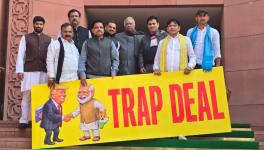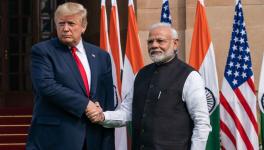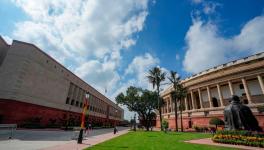Inequality Gets a Hold of the World Through Globalization
Newsclick and The Real News Network spoke to Rajat Nag, former Manager Director General, Asian Development Bank, on globalization and Davos 2017 conference. World economic forum doesn’t seem to have addressed the issue that there has been a backlash to globalization. Ironically, it is countries like China, India, Vietnam, Thailand, Malaysia that are for globalization. President Xi Jinping in Davos talked about globalization, against protectionism. While U.S. under Trump, is talking about going protectionist and isolationist. As globalization spreads, inequality rises. The latest Oxfam report ‘An economy for the 99 percent’, shows that the gap between rich and poor is far greater than had been feared. According to the report, just 8 men own the same wealth as half the world. As a solution to this, we will have to start looking at some means of income transfer, Universal basic incomes, greater emphasis on education and health. With such disastrous drawbacks of globalization, will the elite economists address these concerns, or remain oblivious to the problems of the real world?
Rough Transcript:
Prabir Purkayastha (Prabir): Hello and Welcome to Newsclick. This programme, with The Real News. Today we will be discussing the Davos show, The World Economic Forum and the kind of messages that have been given from Davos. We have with us Rajat Nag, formerly from Asian Development Bank. Rajat, World Economic Forum doesn't seem to have addressed the issue that there has been a backlash to globalization. We have seen for instance, the rise of Donald Trump talking about the problems of globalization, the BREXIT and also in a lot of other countries there has been a very large set of movements against this kind of globalization. Also, the rise of inequality which we just have seen the Oxfam report, 8 people own more than 50 percent wealth of the world. How do you see the Davos react to such things? Or is it that the economic elite are completely oblivious to the problems of the real world?
Rajat Nag (Rajat): I hope they are not, because I think the facts that you have just mentioned Prabir, are real and my concern is that if the elites, the global elites, don't recognize this, just sort of put it off as the lament of the unaware, lament of the demagogues etc., we will all be making a terrible mistake. I mean, unequivocally I am and have been a very strong proponent of globalization. But I think we have to recognize the downsides of globalization, the so called, as you have mentioned, globalization and its discontents and we have to address to, those are real. I mean, globalization has severe downsides and in Davos, I have to say to be fair to them, this time at least I do not as they say some discussion about inequality, there is some discussion happening about the hollowing out of the middle class etc. But the global-ization is certainly under attack and maybe some for the wrong reasons. But there are some very major issues that we have to address. I will be very happy to discuss them with you.
Prabir: When we talk about globalization, there could be globalization of the people, migrations. There could be globalization of ideas. There could be even globalization of things like medicine and knowledge. But instead of that, what you really have seen is a kind of predatory globalization of the financial oligarchy, so to say. Argument is, finance should be able to travel, but people should not. Now that's the kind of globalization then, that can lead to complete inequalities that have grown over the years. And today, we are not seeing just the increased wealth going to the rich. What we are also seeing is the net transfer of wealth in India that 1 percent is getting from the others. Now, those are the issues that needs to be addressed. Are they really being addressed, even in the discussions that you are talking about?
Rajat: I agree with you. I think those are exactly the ones that needs to be addressed and I am afraid they are not, to the depth they should, because it is not just a question of the financial globalization I think, it all started with trade globalization. And that is good. The whole David Ricardian principles of comparative advantage and the economics of trade. So globalization has brought benefits, but the benefits of globalization accrue to many and that's why you see 300 dollar TV sets being available in the markets in the US. But the costs of globalization are borne by a few. And I think, we have all glibly assumed that the gainers, who are much larger than the losers, will somehow compensate or the state will make sure it is compensated and that has not happened. The whole issue is of how are the losers compensated for the losses. People do loose jobs because of globalization. That's a fact. But I think the larger point you raise is a very important one, that globalization of just certain segments which suit us and let's face it I mean globalization did not start only in 1960s. It started much earlier with the opium war, it started with the East India Company coming to India. Let’s face it, those are the real globalization in the rawest form. Now countries in the Western economy which is actually benefited from the globalization are the ones who are suddenly finding that the chicken is coming to home to roost and therefore, they are saying let's close down the shutters and go protectionists. Ironically, it is not China, India, Vietnam, Thailand, Malaysia who are for globalization and I was struck by the fact that President Xi Jinping yesterday in the Davos was the one who was talking about globalization against protectionism and US is the one under President elect Trump which is talking about sort of going protectionist and isolationism.
Prabir: Rajat I will come to this point that you raised in the discussion that losers are few, benefits accrued to many. Now, it could be argued that it's true that manufacturing was growing. When manufacturing does not grow in a country, then the losers are also many and the gainers are actually the few, the one percent argument which is coming out clearly. So it is not just a net loss of increase of income, we are seeing actually net loss of income. So that's one part of globilization. Second part of which I think is the other one which the Davos group of the World Economic Forum does not want to address at all is the issue of financial globalization which has meant loss of actual tax revenues. We have already seen tax havens, we have seen various kinds of Shenanigans and most of all today, with the rise of what could be called digital monopoly, who don't pay tax anywhere. So we are really seeing loss of net income and therefore the talk about lifting people out of poverty in this day and age, particularly post 2008, post the global crisis, I don't see that happening again. Therefore, we really are seeing a different phenomenon.
Rajat: Let's break it down into two. Let me take your second point first, a very important one and that is the whole issue of financial governance and I think the financial crisis of 2008 was really created by pursuit of financial profits at the cost of many. Therefore, the whole issue of a universal taxation regime, not sort of being able to hide under the tax havens, either locally or globally, becomes very important. I think there is no question about it that the financial governance structures, the architecture of the financial systems need to be much fairer and need to be much more inclusive than they have been not just ruled from the Wall Street or from the city in London.
I would somewhat disagree with you about the globalization not helping with the poverty reduction. I think even now, it would be fair to say that trade, enhanced trade, open trade regimes globally have actually resulted in significant reductions in poverty be it China, be it India. What I think you are absolutely correct and you have hit the nail on the head is how those benefits are being shared or not being shared. Therefore, as they you say the benefits of globalization, financial globalization, trade, seem to be accruing to increasingly to a smaller and smaller number, percentage wise and in absolute terms. Therefore, the figure you quoted from the OXFAM report and I think were national governments and may be the global governance has failed is to address the real losses been suffered. When I see few, I mean in relative terms. The gainers are much larger and in absolute numbers than the losers but those losers are not insignificant and I think what we have failed to do is to recognize the real pain and losses accruing are suffered by a group of people. So I think will probably have to start thinking about some means of income transfers, some means of universal basic incomes, greater emphasis on education and health because increasingly it is the people with knowledge who will benefit more in a globalized economy and that's sort of inevitable.
Prabir: As you can see the reverse is what's happening in most of the places, privatization of education, privatization of health which is really emerging on a much bigger scale than ever before. The whole concept of public health, at leasr in countries like India is sort of being given up. So you really have on one hand need for what you have identified, irrespective we agree on the the losers and the gainers argument. But we all agree that yes the public health system, the public education, redistribution of the incomes all this must takes place. But do you see Davos addressing this in a meaningful sense and when you talk about the universal taxation policies, do you see Davos actually putting up an agenda? That's why I am saying is that the same old, same old endeavor.
Rajat: I know you are using Davos as a short form for the liberal elites and the economic elites.
Prabir: Specifically for the World Economic Forum which really sees the globally most powerful people.
Rajat: I am taking the World Economic Forum to be larger than just Davos. But the point is very valid. Well, I think, the time has come for the Davos group and that certainly includes a large number of people who are not physically at Davos to recognize exactly these issues. For example, whether it is globalization in trade or financial globalization, the losses in jobs in many of these countries, in the West is happening not because of trade but because of technology. Productivity increases in the US has become very high so that the total output increases has not been matched by the employment increases. As a matter of fact, why US even in China I have seen factories which are run essentially by robots. So I think the global elite has to recognize the economic order is changing and there the people who have been left behind cannot just be left to either fend for themselves or have some sort of a quaint naive belief in trickle down and sometimes as you were saying even trickling down is not happening. And if it is happening, it is happening at a much slower rate. So I think it calls for a very significant interventionist, I would say, public policy.
Prabir: My apprehension is that while recognizing some of the ills, as it were, that there is a fundamental problem at the core of the global economy today is actually not being recognized and that's were the dissidence really comes from. You are really trying to say let's take care of the fever, but you are not talking about what is the infection.
Rajat: I agree and I think this is what it is very important for all of us irrespective of the labels on the ideology and all which one may put. To sort of look at why this is happening. I think it will be a pity if you start turning the clock back on for example more open trade. I mean I believe that everybody will benefit with greater open trade regimes. But, the question of fairness, you cannot have some countries particularly the developed economies being all in favour of open trade when it suits them and then when it comes to the agriculture, you close the door and say no, we in the US, we in EU will continue subsidizing farmers who are orders of magnitude more expensive than agriculture producers in Africa or Asia. So yes, I think I am all for open trade as long as it is fair. You cannot have people been pro-globalization when it suits them and against it when it doesn't. And it is not a question of Left or the Right. As one of my friends said Marx would have been very pleased to hear us talk about universal basic income. But whichever political spectrum you are coming from, I think we need to really put all of these issues on the table, because I think there are very major issues for society when say in a country like India 1 percent owns 58 percent of the country’s wealth and as you quoted, 8 people in the world own more than half what the global population. So that there are some major challenges.
Prabir: Thank you very much Rajat for being with us. We will continue to discuss these issues further with you.
DISCLAIMER: Please note that transcripts for Newsclick are typed from a recording of the program. Newsclick cannot guarantee their complete accuracy
Get the latest reports & analysis with people's perspective on Protests, movements & deep analytical videos, discussions of the current affairs in your Telegram app. Subscribe to NewsClick's Telegram channel & get Real-Time updates on stories, as they get published on our website.
























